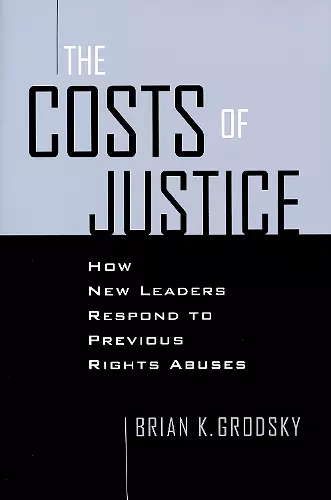Costs of Justice
How New Leaders Respond to Previous Rights Abuses
Format:Hardback
Publisher:University of Notre Dame Press
Published:1st Aug '22
Currently unavailable, and unfortunately no date known when it will be back

In The Costs of Justice, Brian K. Grodsky provides qualitative analyses of how transitional justice processes have evolved in diverse ways in postcommunist Poland, Croatia, Serbia, and Uzbekistan, by examining the decision-making processes and goals of those actors who contributed to key transitional justice policy decisions. Grodsky draws on extensive interviews with key political figures, human rights leaders, and representatives of various international, state, and nongovernmental bodies, as well as detailed analysis of international and local news reports, to offer a systematic and qualitatively compelling account of transitional justice from the perspective of activists who, at the end of a previous regime, were suddenly transformed from downtrodden victim to empowered judge.
Grodsky challenges the argument that transitional justice in post-repressive states is largely a function of the relative power of new versus old elites. He maintains that a new regime's transitional justice policy is closely linked to its capacity to provide goods and services expected by constituents, not to political power struggles. In introducing this goods variable, so common to broad political analysis but largely overlooked in the transitional justice debate, Grodsky argues that we must revise our understanding of transitional justice. It is not an exceptional issue; it is but one of many political decisions faced by leaders in a transition state.
“Brian K. Grodsky seeks to understand the sources of diversity in transitional justice processes and, by implication, a broad range of post-conflict policy making. He develops and empirically evaluates a theoretical framework, relying on extensive original primary research and cross-national fieldwork—all things that have traditionally been lacking in much of the relevant transitional justice literature, until recently. The Costs of Justice is situated on the cutting edge of the field.” —David Backer, The College of William & Mary
"An insightful, profound, and conceptually innovative analysis of the daunting challenges encountered by the new democracies in their endeavors to confront the traumatic past. Grodsky's comparative approach allows him to highlight similarities and differences between states, institutions, and elites engaged in pursuing political and moral justice. A most valuable contribution to the major ongoing debate on the relationship between democracy, history, memory, and justice." —Vladimir Tismaneanu, University of Maryland
“The Costs of Justice: How Leaders Respond to Previous Rights Abuses . . . provides an innovative study of the process by which governments decide which transitional justice policies to adopt. Grodsky makes an interesting contribution to the field of transitional justice, by focusing on the domestic dimensions, and power play that affect and often define justice policy-making in transitional societies. Furthermore, the author does a commendable job at highlighting the similarities and differences between all four states in their attempts to come to terms with their past and carry out justice.” —Journal for Peace and Justice Studies
“While attempts to understand, or evaluate, the social and political effects of transitional justice policies have also attracted growing interest from a wide array of academic disciplines, from political science and law to sociology and psychology, Grodsky seeks to bring methodological clarity to attempts to explain transitional justice.” —International Journal of Transitional Justice
“A truly international comparative history, with a clear explanatory model that can be tested in other regions of the world that have undergone often wrenching post-totalitarian changes with the demise of the Cold War. . . This work deserves to be on the bookshelf of anyone who studies transitional justice, for it will be cited by forthcoming works in the field for years to come.” —Human Rights Review Online
“This is an important new book that will be of major interest to those engaged in the study of transitional justice as well as scholars and practitioners working in the related literatures of political science, human rights, and democratization.” —International Studies Review
ISBN: 9780268205959
Dimensions: 229mm x 152mm x 21mm
Weight: unknown
366 pages